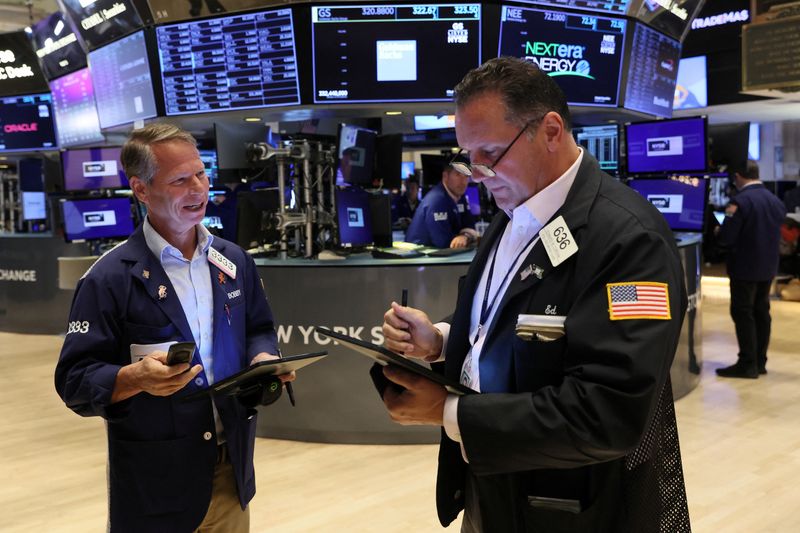TSX runs higher on rate cut expectations
Investing.com - U.S. stock futures waver around the flatline on Tuesday, following a mixed session on Wall Street to begin the trading week. Investors are assessing U.S. President Donald Trump’s threat to "go forward" with postponed tariffs on Canada and Mexico that could upend the North American economy. Elsewhere, the Conference Board is set to unveil new consumer confidence data, while safe-haven demand helps gold hit its eleventh all-time peak so far this year.
1. Futures muted
U.S. stock futures pointed to a subdued open on Tuesday, in a sign of ongoing caution among investors ahead of crucial quarterly results from Nvidia (NASDAQ:NVDA) later this week.
By 05:38 ET (10:38 GMT), the Dow futures contract had edged down by 23 points or 0.1%, S&P 500 futures had shed 13 points or 0.2%, and Nasdaq 100 futures had dipped by 83 points or 0.4%.
The main indices on Wall Street ended a choppy session in mixed fashion on Monday, with the benchmark S&P 500 retreating by 0.5% and the 30-stock Dow Jones Industrial Average adding 0.1%. The laggard was the tech-heavy Nasdaq Composite, which dropped by 1.2% as traders continued to weigh the merits of heavy artificial intelligence spending by mega-cap tech companies heading into Nvidia’s earnings on Wednesday.
Sentiment was also impacted by President Trump’s statement that 25% tariffs on Canada and Mexico would be "going forward" after they were previously delayed until March (more below). Markets are gauging the implications of recently soft economic data and persistent uncertainty around U.S. political developments as well.
In Asia, most stocks sank. Risk appetite was hit by a Bloomberg News report that the White House was seeking to toughen Biden-era controls on semiconductor technology exports to China -- especially chips from Nvidia. This came after Trump over the weekend called for more scrutiny on Chinese investments in key U.S. sectors, threatening to ratchet up tensions with Beijing.
2. Trump on Canada, Mexico tariffs
American levies on imports from Canada and Mexico are "on time and on schedule" even though both countries have worked to bolster border security, Trump said on Monday.
Trump made the remark after he was asked if America’s northern and southern neighbors had done enough to avoid the tariffs. Earlier this month, Trump agreed to delay the duties until March 4 after leaders in Canada and Mexico agreed to do more to beef up security measures at their respective U.S. borders, particularly with the aim of stemming the flow of the drug fentanyl.
Trump did not specifically mention the March 4 deadline when the tariffs are due to come into effect. The move would apply to more than $918 billion worth of U.S. imports from Canada and Mexico, and threaten to upend the deeply-integrated North American economy.
He also reiterated his desire to institute sweeping "reciprocal" tariffs designed to match levies placed on U.S. goods and offset trade barriers.
3. Conference Board consumer confidence report ahead
U.S. consumer confidence is expected to have weakened for a third straight month in February, according to estimates for a key index due out on Tuesday.
Economists expect the Conference Board’s consumer confidence index to have slipped to 102.7 this month, down from 104.1 in January.
Recent data has shown a steep fall in retail sales activity, a deterioration in consumer sentiment, and one-year inflation expectations jumping to a 15-month high. Households have been fretting over whether it is too late to avoid the potential impact of Trump’s tariff plans on price growth, a University of Michigan survey indicated.
Still, while the figures presented some "red flags" around the U.S. economy, the broader backdrop remains "OK" and "should help reduce the risk of steep equity slumps," according to analysts at Vital Knowledge.
4. Fed’s Logan floats discount-window loan auction idea
A move by the Federal Reserve to allocate a "modest share" of its long-run balance sheet to loans or repos could improve both the efficiency and effectiveness of policy implementation, Dallas Fed President Lorie Logan has argued.
Speaking at a conference in London, Logan added that auctioning off a fixed quantity of discount-window loans each day may "encourage banks’ operational readiness" and demonstrate that borrowing is a "normal activity" for healthy companies.
"Such a facility might also smooth the redistribution of reserves around the banking system," Logan said.
In recent years, the Fed has moved to persuade lenders to take advantage of its so-called "discount-window" loans, which offer cash to banks that need immediate liquidity in exchange for collateral like business loans.
Banks, however, have balked at the idea, viewing it as a possible indicator of distress to its competitors and stakeholders. Some Fed officials have said this belief could deprieve smaller banks and the broader financial system of possible access to a liquidity backstop.
5. Gold hovers around record high
Gold prices were lower in early European trade on Tuesday, but remained close to recent peaks as safe-haven demand was underpinned by concerns over U.S. trade tariffs.
The yellow metal had risen in overnight trade, touching a new record high, after Trump signaled his intention to go ahead with the levies on Canada and Mexico.
Meanwhile, oil prices ticked higher after the U.S. placed fresh sanctions on more than 30 brokers, shipping firms, and tanker operators over their role in transporting Iranian oil. The decision raised worries around tightening supplies.
